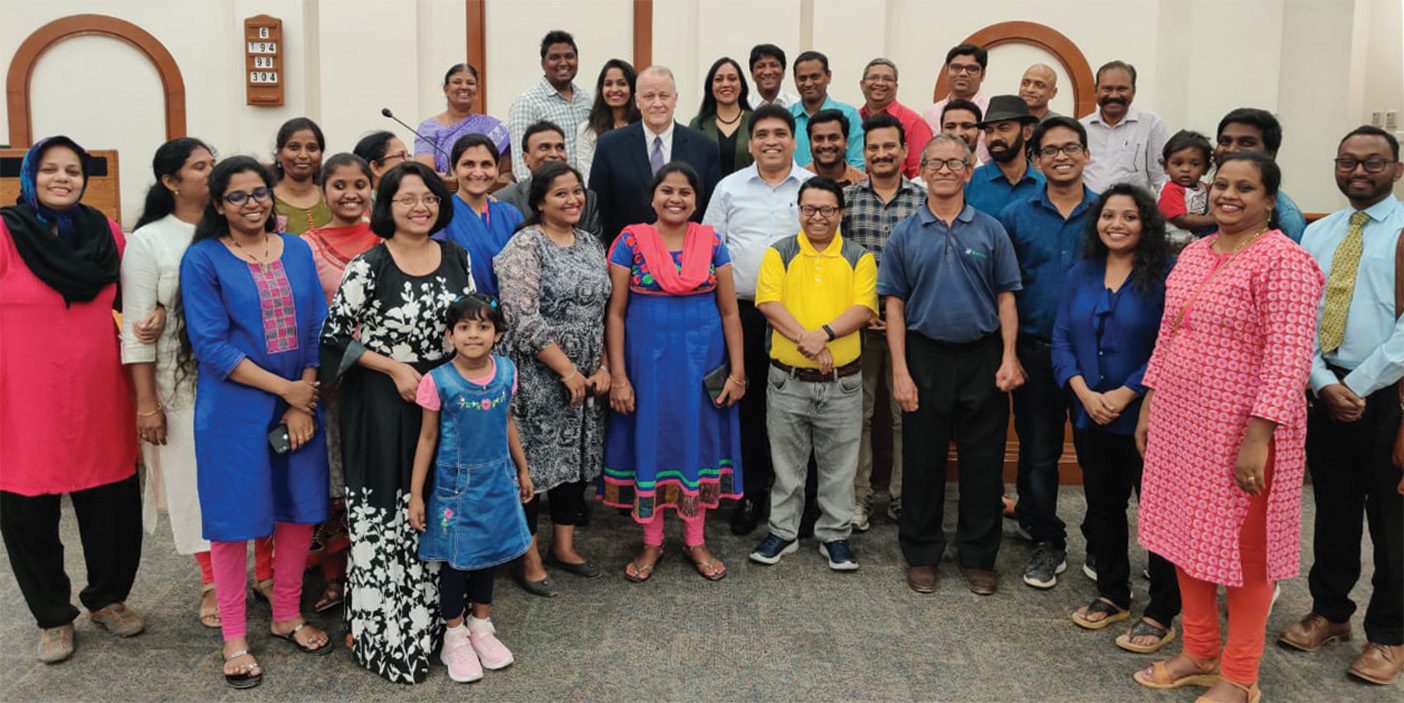The Lord Knows You
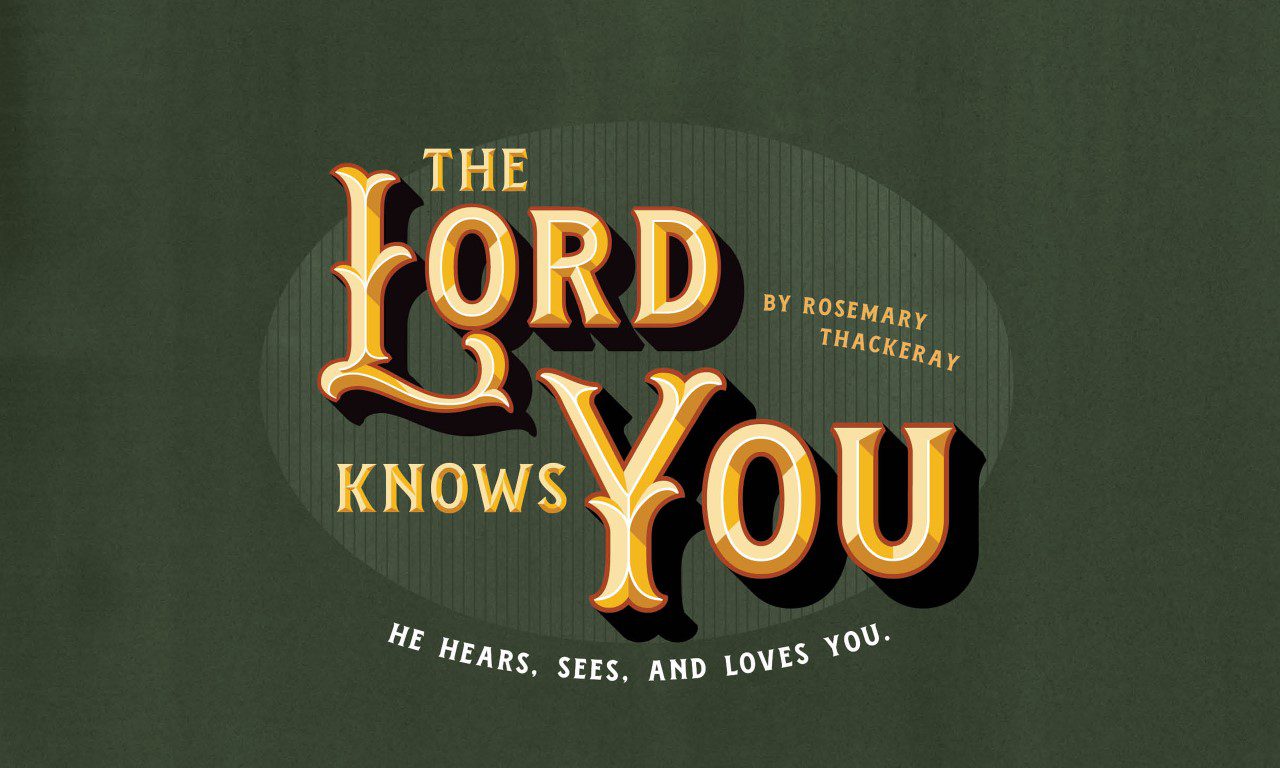
By Rosemary Thackeray in the Fall 2020 Issue
Illustrations by Alex Nabaum
When my nephew Justin was 5 years old, he started exhibiting behaviors that were concerning for my sister Laura and her husband, Mark. For example, he forgot how to pull up a zipper on his jacket; he would stumble walking up the school bus steps; when washing his hands Justin said he could not see the soap on the bathroom sink; and he became increasingly ill for no apparent reason. Laura reached out to her pediatrician. The doctor suggested Justin had just started school, so he was likely experiencing separation anxiety being away from his mother.
One Sunday afternoon in early October, Laura’s family and I were visiting my parents. Usually Justin would eagerly respond to my invitation to walk to the school playground for a ride on the swing. That day he was not interested. He said, “I just want to stay with my mom.” As we gathered around the kitchen table eating lunch, Justin had a faraway look in his eyes. A somber feeling permeated the house. Laura, Mom, and I sat on the living room couch, the warm afternoon sun streaming in the windows as we tenderly discussed Justin’s situation. We gently wiped away the tears that trickled down our cheeks.
As I drove home from my parents’ that October evening, reflecting on Justin’s situation, I had a distinct impression come into my mind—I either believed that when I prayed, God heard and answered my prayers, or I did not. The time to develop faith was past.
The next morning when I arrived at work, I picked up the telephone and called Laura. I can still remember exactly where I was standing in my office in BYU’s Richards Building. I said to her, “Laura, I know you are the mom, but there is something seriously wrong with Justin.”
In a quivering voice, she quietly responded, “I know.”
I encouraged her to call a relative who is a doctor. I knew he’d get Justin in for an appointment.
A few hours later Justin had a diagnosis. The next day he had brain scans at the local hospital. The following day Justin was at Primary Children’s Hospital in Salt Lake City, Utah, meeting with two surgeons. One of the surgeons, who was not supposed to be on call that day, was a brain-tumor expert and familiar with this rare astrocytoma. They inserted a shunt into Justin’s head to drain the accumulated fluid, and then, two days later, the surgeons performed an 8-hour surgery, removing as much of the brain tumor as they could without destroying Justin’s vision.
During the next few days, weeks, and months, I prayed frequently, sincerely, and earnestly for Justin’s health and recovery. I know from personal experience that not all prayers are answered in the way we would like or in the time we prefer. We pray, we petition, we wait upon the Lord.
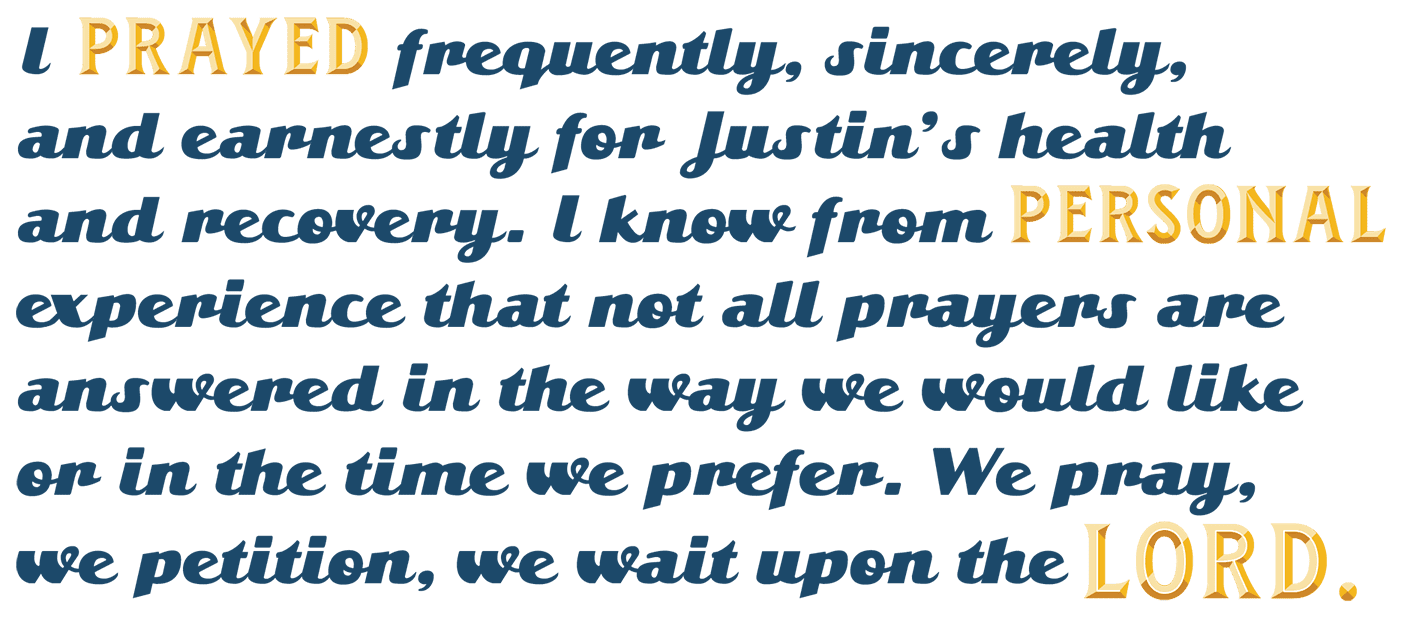
Today Justin is a healthy, happy, talented, and kind young man. Justin’s life is a miracle. He is a reminder to us that Heavenly Father and Jesus Christ are in the details of our lives. They were, and are, mindful of Justin and his situation. They knew what he was experiencing, what medical assistance he needed at that exact moment, and who would be able to provide that care.
Prophets in the scriptures repeatedly admonish us to remember the goodness of God (see Mosiah 4:11–12). Likewise, we are commanded to thank the Lord in all things (see D&C 59:7). Recognizing and recording moments when we experience Christ’s hand in our lives is not just for our benefit. Sharing these stories with others can help them to trust in God and keep His commandments (see Ps. 78:2–7).
God Knows You
God and Jesus Christ know us. They know you. They know your name. Jesus Christ not only calls the stars by their name (see Ps. 147:4), but He knows and calls His sheep—you and me—by name (see John 10:3).
He knows each of us individually—not collectively as a group of His children. It is not the same level of knowing as I know the students in my class or the sisters in my stake Relief Society. He knows our innermost thoughts. The desires of our heart. Our dreams. Our disappointments.
Because Jesus Christ knows you and me, we can trust Him to help us. He knows what assistance we need and when it would be best for us to receive that support. He knows how and when to reach out and succor us.
He declared: “I am the good shepherd, and know my sheep, and am known of mine” (John 10:14). The Savior knows us. The question for us is, do we know Him?
Through the Prophet Joseph Smith He added: “If they know me they shall come forth, and shall have a place eternally at my right hand” (Mosiah 26:24).
How can we know the Savior better than we do today?
He Hears You
In the Book of Mormon, the Savior commanded the Nephites, and us today, to always pray unto the Father in His name (see 3 Ne. 18:19).
Elder David L. Frischknecht (BA ’78) shared the following about the miracle of prayer:
There is nothing ordinary or automatic or formulaic or common about prayer. Every time we sincerely pray to the Father in the name of the Lord, a unique, sacred miracle occurs.
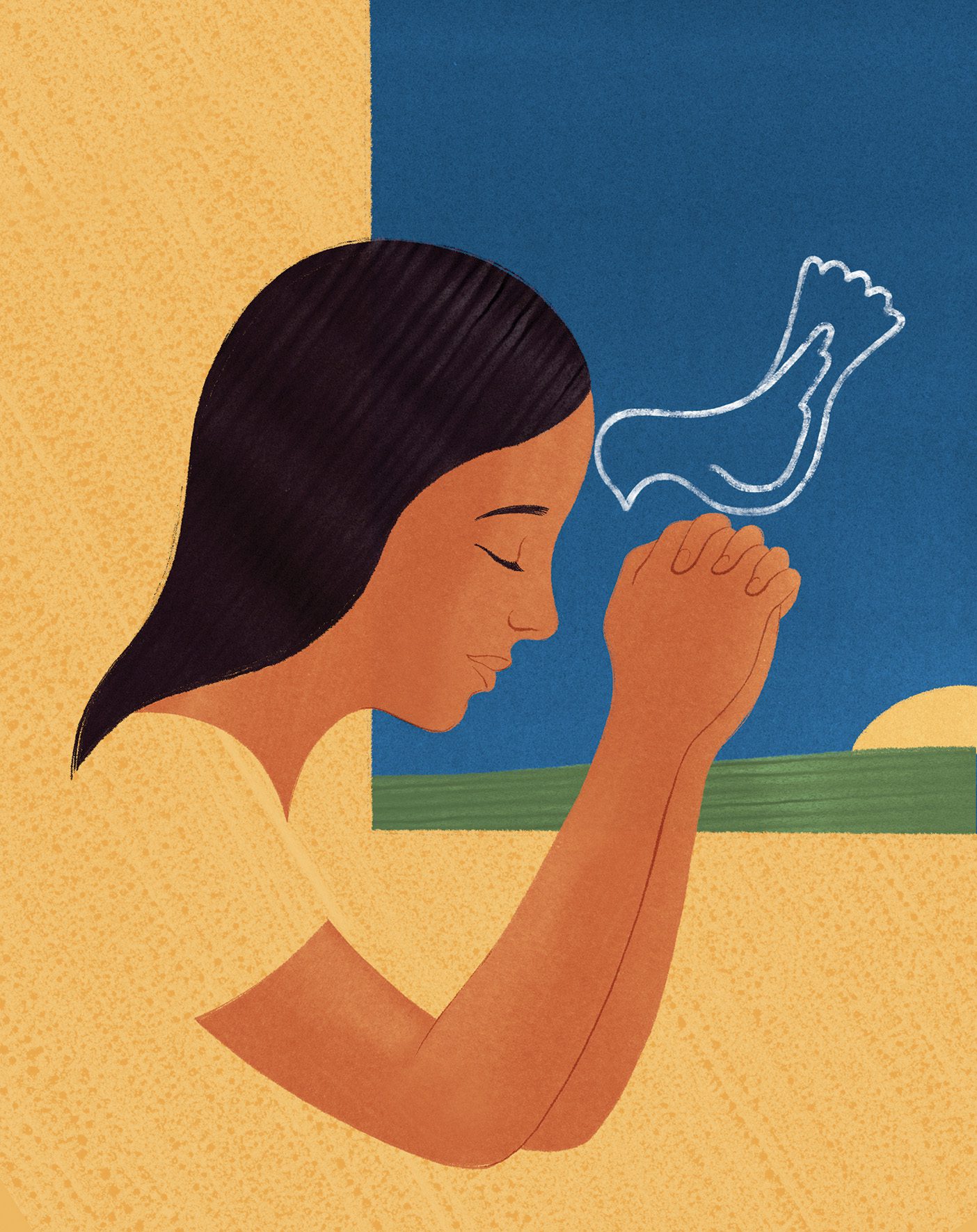
And the miracle is not simply that you found your lost car keys or that you remembered the right answer on the test or even that you received an answer to an urgent question in your life, though these might be miracles you would recall. The miracle is that you actually talked with God and that He in fact heard you and answered you.¹
You could probably share an experience where you prayed and God heard you and answered you. It may have been when you poured out your soul to Him in audible prayer. Or it may have been a silent prayer offered in a public place. Or a prayer you held in your heart for years.
Sister Bonnie D. Parkin, former Relief Society general president, shared the following story about her husband’s grandmother receiving a direct answer to prayer:
Anna Matilda Anderson was a young girl who lived in Sweden in the 1880s. When she and her family joined the Church, they were ridiculed for their beliefs. Anna’s mother decided they should move to America and join the Saints in Utah. Anna was 11 years old when she and her sister, Ida, were sent ahead to earn money and bring the rest of the family. They sailed to the United States, then traveled by train to Ogden, Utah, where Ida left by covered wagon to work for her sponsors in Idaho. Anna was completely alone on that train as it continued to Salt Lake City. She spoke no English and knew no one. . . .
The train pulled into the darkened Rio Grande station just before midnight. The relative who was to meet Anna was not there. Anna stood watching with dread as the station slowly emptied. Finally, she was alone with a German family who also had no one to meet them. The darkness was thick and threatening, closing in around her. She later recalled: “I started to cry and thought about the last thing my mother told me: ‘If you come to a place where you can’t understand what the people are saying, don’t forget to pray to your Father in Heaven because He can understand you.’” Anna knelt by her suitcase and pleaded with all her might for heavenly help. . . .
The German family motioned for Anna to follow them. Having no other choice, she walked behind them, crying. Arriving at Temple Square, they heard rapid footsteps. A woman was hurrying toward them, studying each person she passed. She looked at the German family, then pressed on. Anna caught the woman’s searching gaze. The woman stopped, unbelieving. She recognized the young girl! And with a shock, Anna recognized the woman. She was her Sunday School teacher who had left Sweden a year earlier!
Pulling Anna tightly into her arms, the teacher wiped away her frightened tears. She told Anna: “I was awakened over and over again. . . . Images of the arriving immigrants raced through my mind. I could not go back to sleep. I was prompted to come to the temple to see if there was anyone I knew here.”
Can you believe it? A Sunday School teacher sent in a pitch-black night like an angel of light! “So you see,” Anna remembered, “my Heavenly Father more than answered my prayers. I only asked for someone who could understand me, and He sent someone I knew.”²
God hears us when we pray. The question for us is do we hear and know the Good Shepherd’s voice (see John 10:3)?
The ability to hear the Lord’s voice is an indication that we are His disciples. After King Benjamin’s people made a covenant to take upon themselves Christ’s name and obey His commandments, King Benjamin admonished them to both know and hear the voice by which they were called (see Mosiah 5:8, 12).
As we increase our capacity to hear Jesus Christ’s voice, we, like Anna’s Sunday School teacher, are able to receive promptings for how we can best serve others.
President Russell M. Nelson has specifically invited us to think about how we hear the voice of the Lord and to take steps to hear Him better and more often.3
He Sees You
Perhaps there have been times you felt insignificant, even invisible. It may have seemed that nobody, including God, was aware of you. Even Joseph Smith cried out in Liberty Jail, “O God, where art thou? And where is the pavilion that covereth thy hiding place?” (D&C 121:1).

The truth is, the Lord sees us, even though we cannot see Him. “But behold, verily, verily, I say unto you that mine eyes are upon you,” He assures. “I am in your midst and ye cannot see me” (D&C 38:7).
It is when we feel little or no control over our circumstances that we earnestly seek an affirmation that the Lord sees us and is aware of our situation. That is how I felt last summer when both my parents were experiencing failing health. My dad was diagnosed with cancer followed by the discovery of a volleyball-sized tumor on his kidney. My mom had several health challenges, all of which were compounded by advanced dementia, which seemed to progress exponentially with my dad’s declining health. I was starting a new position at work, my schedule would be more demanding, and I was anxious about how my three siblings and I would care for mom once our dad passed away.
One day I went to the temple with the purpose of seeking an answer to a course of action for my mom. As I waited to participate in the ordinances, the impression came that many family members were waiting on the other side of the veil to greet my mother. As I spent time pondering, I picked up the scriptures and the pages fell open to Doctrine and Covenants 44:6, which reads: “Behold, I say unto you, that ye must visit the poor and the needy and administer to their relief, that they may be kept until all things may be done according to my law which ye have received.”
There was my answer—I just needed to keep visiting Mom and doing what I could to relieve her suffering. The Lord was mindful of us.
Five days later Dad passed away. In the early morning hours on the day of Dad’s funeral, Mom quietly crossed the veil to be reunited with her sweetheart. My prayers were answered, and her burden was lifted.
He Loves You
Elder Dieter F. Uchtdorf stated:
Our Savior, the Good Shepherd, knows and loves us. He knows and loves you. He knows when you are lost, and He knows where you are. He knows your grief. Your silent pleadings. Your fears. Your tears. It matters not how you became lost—whether because of your own poor choices or because of circumstances beyond your control. What matters is that you are His child. And He loves you. He loves His children.4
The Savior loves us. Do we love Him?
If we “love God with all [our] might, mind and strength,” we are promised that “then his grace [is] sufficient for [us]” (Moro. 10:32).
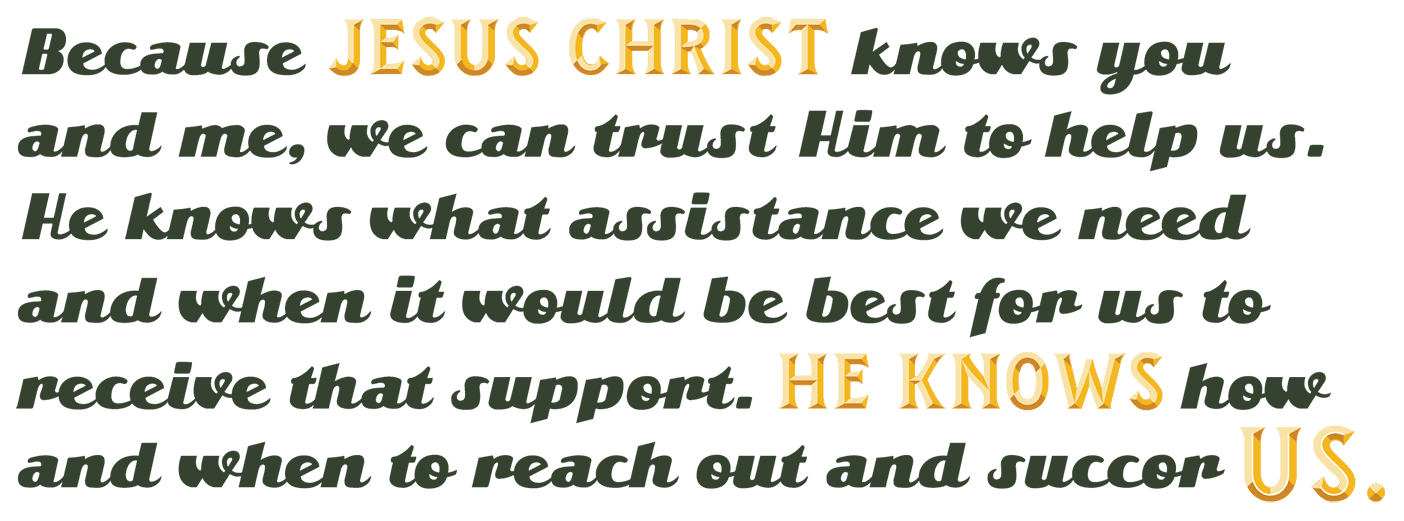
In Hebrew the root word for grace is chanan, which means “to bend or stoop in kindness.”⁵ What a powerful image. Because of His Atonement, Christ is bending down, or stooping in kindness, to help us through our challenges in life.
When we love the Savior, we, in turn, extend charity, the pure love of Christ, to others—we love without judgment, conditions, or any expectations of love in return (see John 13:34–35).
Elder Jeffrey R. Holland (BS ’65, MA ’66) suggested that one day we will individually report on our love for God:
I am not certain just what our experience will be on Judgment Day, but I will be very surprised if at some point in that conversation, God does not ask us exactly what Christ asked Peter: “Did you love me?” I think He will want to know if in our very mortal, very inadequate, and sometimes childish grasp of things, did we at least understand one commandment, the first and greatest commandment of them all—“Thou shalt love the Lord thy God with all thy heart, and with all thy soul, and with all thy strength, and with all thy mind.”⁶
The Quest of a Lifetime
It is the quest of a lifetime to come to know the Savior, to hear Him, to see and recognize His hand in our lives, and to demonstrate our love for Him.
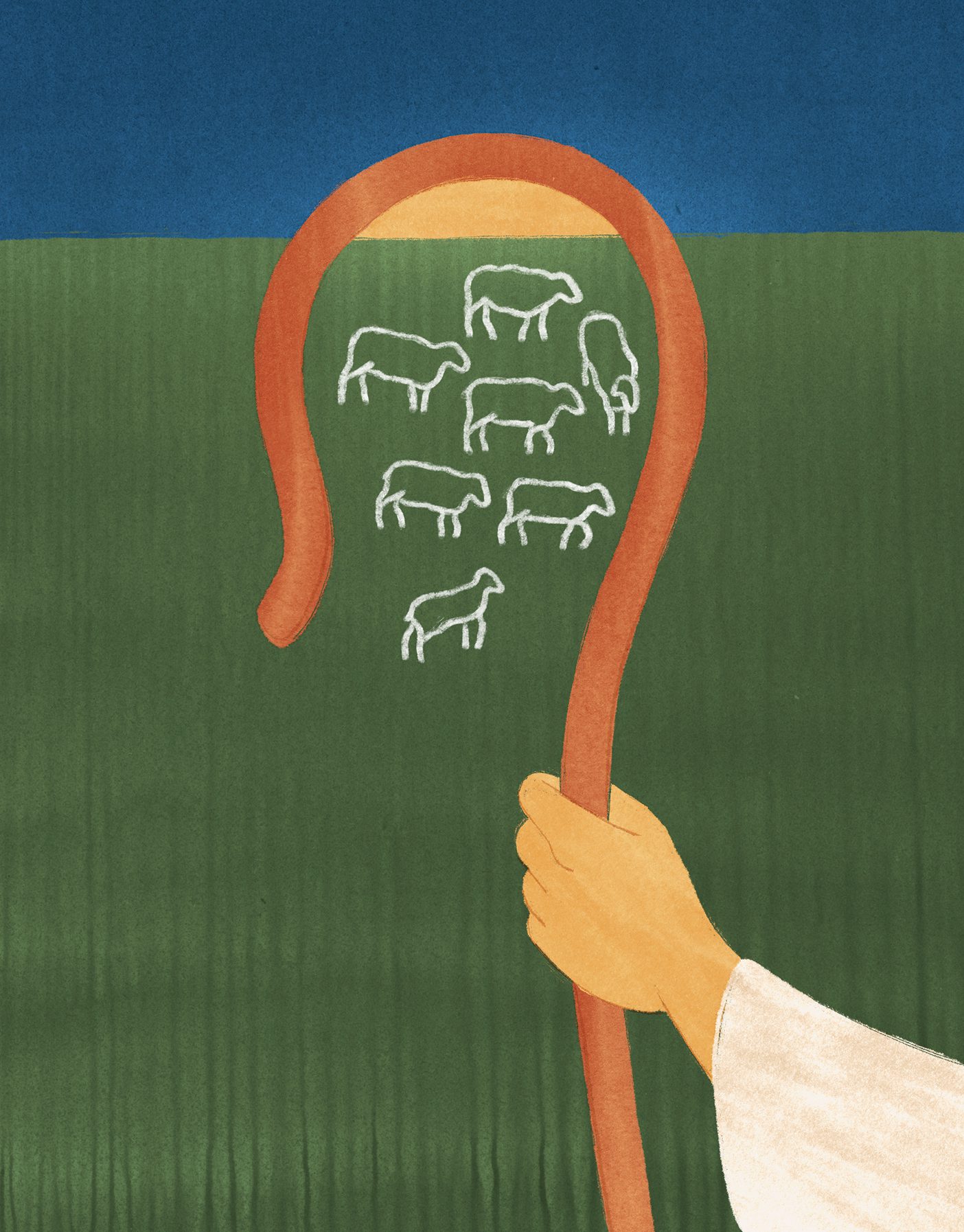
Knowing the Lord has our back will give us the courage and confidence to face any trials that will come our way. When our foundation is the Lord, Jesus Christ, the devil may “send forth his mighty winds, yea, his shafts in the whirlwind,” but they will have no power to drag us “down to the gulf of misery and endless wo” (Hel. 5:12).
Several years ago, I was earnestly seeking an answer to a life question. One Sunday I approached the Lord in fasting and prayer. I determined to end my fast after I met with the stake presidency to be set apart for a calling. During the setting apart, the blessing I received was beautiful, but my question remained unanswered. At the conclusion of the meeting the stake president invited me to remain after the other seven or eight people left the room. He then told me that there was more to my blessing but he felt it was too personal for the other people to hear.
In that sacred setting as the stake president and his counselor once again placed their hands on my head, I received direct, unmistakable, personal revelation.
This event has been a touchstone for me. When I begin to wonder if God knows me, sees me, hears my prayers, and loves me, I reflect back to that evening when God answered a prayer that was known only to Him and me alone (see D&C 15:3).
I joyfully testify of these truths. I know that Heavenly Father and Jesus Christ live. They are mindful of me and of you. They are in the details of our lives.
Rosemary Thackeray, a BYU professor of public health, currently serves as assistant to the president for assessment and planning. This article is adapted from an address she shared May 1, 2020, at the BYU Women’s Conference. The full address is available at womensconference.byu.edu.
Feedback: Send comments on this article to magazine@byu.edu.
NOTES
- David L. Frischknecht. “Always Pray unto the Father in My Name,” BYU–Idaho devotional (byui.edu/devotionals/david-l-frischknecht).
- Bonnie D. Parkin, “Finding Faith in Every Footstep,” Ensign, May 1997.
- Russell M. Nelson, “How Do You #HearHim? A Special Invitation,” blog post, Feb. 26, 2020 (churchofjesuschrist.org/blog/how-do-you-hear-him-a-special-invitation?lang=eng).
- Dieter F. Uchtdorf, “He Will Place You on His Shoulders and Carry You Home,” Ensign, May 2016.
- Wikibooks, s.v. “Hebrew Roots/The original foundation/Grace,” last modified Feb. 2, 2020, 19:25, en.wikibooks.org/wiki/Hebrew_Roots/The_original_foundation/Grace.
- Jeffrey R. Holland, “The First Great Commandment,” Ensign, November 2012.


